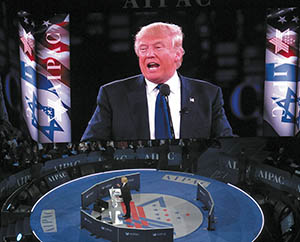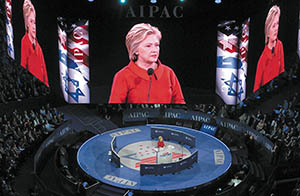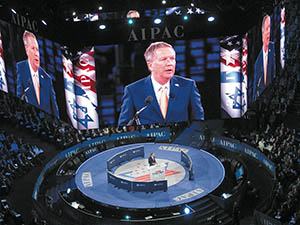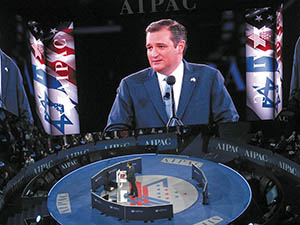



Donald Trump Unveils Three-Pronged Iran Strategy, Humors AIPAC Crowd
(Jacob Kamaras/JNS.org) In a much-anticipated speech to the American Israel Public Affairs Committee (AIPAC) conference on Monday, Republican presidential primary front-runner Donald Trump said that dismantling the “disastrous” Iran nuclear deal would be his top priority as president. Trump also unveiled a three-pronged strategy for dealing with Iran, offering the type of detailed policy talk that many critics have accused him of leaving out of previous speeches.
“We’ve rewarded the world’s leading state sponsor of terror with $150 billion, and we’ve received actually nothing in return,” he said.
Trump was the subject of much pre-conference debate regarding whether or not AIPAC should have invited him, due to his controversial policy proposals such as banning Muslim immigration. But he earned far more cheers and laughter than boos during his speech, resulting from his jokes, his stylistic choices such as the repeated use of the phrase “believe me,” and his well-known propensity to make sweeping declarations. He told the crowd that he was speaking to them “as a lifelong supporter and true friend of Israel, and a newcomer to politics, but not to backing the Jewish state.” He noted that in the spring of 2004, at the height of the violence of the second Palestinian intifada, he served as grand marshal of New York City’s Israel Day Parade.
“Many people turned down this honor” because it was a dangerous time for Israel and its supporters, said Trump, but “I did not. I took the risk, and I’m glad I did.”
“But I didn’t come here tonight to pander to you about Israel,” he told the audience. “That’s what politicians do. All talk, no action. Believe me.”
Instead, Trump said he came to speak about future of America’s relationship with Israel, which he praised as “the only democracy in the Middle East.”
Trump said he has studied the Iranian nuclear issue “greater than anybody else. Believe me.” That statement earned significant laughter from the audience.
The nuclear deal “places limits on [Iran’s] military nuclear program for only a certain number of years,” but once that period expires, Iran will have a weaponized nuclear program “ready to go,” said Trump.
The businessman said he would adopt a three-pronged strategy on Iran as president: standing up to Iran’s aggressive push to destabilize and dominate the region, dismantling Iran’s global terror network, and vigorously enforcing the terms of the nuclear deal.
“If I’m elected president, I know how to deal with trouble, and believe me that’s why I’ll be elected president, folks,” said Trump, proceeding to remind the audience that he is “leading all the polls.”
“We must enforce the terms of the previous deal to hold Iran totally accountable, and we will enforce it like you’ve never seen a contract enforced before folks, believe me,” he said.
Trump lamented that the nuclear deal is “silent” on the testing of ballistic missiles, a move Iran recently carried out in violation of U.N. Security Council resolutions.
“Nobody has done anything about it. We will, we will,” said Trump, earning a standing ovation.
Trump also earned an ovation for saying, “President [Barack] Obama in his final year. Yay.”
“He may be the worst thing that ever happened to Israel, believe me,” Trump said.
Trump vowed to use American veto power in the United Nations to shut down an internationally imposed settlement for the Israeli-Palestinian conflict. “Deals are made when parties come together, they come to the table and negotiate,” while each side makes concessions and gets something of value, said Trump.
“It’s really the parties that must negotiate a resolution themselves, they have no choice…the United States will be useful as a facilitator in negotiations, but nobody should be telling Israel” that it needs to abide by an agreement made thousands of miles away, he said.
Trump said that to make a good deal, you need two willing participants, and it is known that Israel is willing to negotiate a deal. He noted that former Israeli prime minister Ehud Barak made “maybe even too generous” of an offer to the Palestinians at Camp David, only to be rejected by Palestinian leader Yasser Arafat, while former prime minister Ehud Olmert made an “equally generous” offer in 2008 but was rejected by Palestinian Authority President Mahmoud Abbas.
As president, Trump said he would “meet with Prime Minister [Benjamin] Netanyahu immediately.” He said that in Palestinian society, “the heroes are those who murder Jews,” but that glorification of terrorists “will end and it will end soon, believe me.” He did not, however, offer details for how such incitement would end.
“What President Obama gets wrong about dealmaking,” said Trump, “is that he constantly applies pressure to our friends, and rewards our enemies.”
“When the United States stands with Israel, the chances for peace really rise, and rise exponentially,” he said.
Trump also vowed to move the American embassy in Israel “to the eternal capital of the Jewish people, Jerusalem.” He has previously wavered on that issue. He ended his speech on a lighter note, expressing pride that his daughter Ivanka, who is married to Jewish real estate developer Jared Kushner, “is about the have a beautiful Jewish baby.”
“In fact,” Trump said, “it could be happening right now, which would be very nice as far as I’m concerned.”
Hillary Clinton Tells AIPAC She is the ‘Steady’ Alternative to Donald Trump
(Jacob Kamaras/JNS.org) As Democratic presidential candidate Hillary Clinton and Republican contender Donald Trump emerge as the clear front-runners for their respective parties’ nominations, Clinton on Monday told the American Israel Public Affairs Committee (AIPAC) conference that she is a “steady” alternative to Trump when it comes to Israel and the Middle East.
“We need steady hands. Not a president who said he’s neutral on Monday, pro-Israel on Tuesday, and who knows what on Wednesday…Israel’s security is non-negotiable,” Clinton said, referring to Trump’s recent comments that he would be a “neutral” peace broker in the Israeli-Palestinian conflict. Trump’s Republican rivals have also targeted those remarks.
Clinton also used her AIPAC speech to condemn Trump for encouraging violence, “playing coy” with white supremacists, and proposing policies such as a ban on Muslim immigration.
“Will we as Americans and as Israelis stay true to the shared democratic values that have always been at the heart of our relationship?” Clinton asked, adding that values such as a thriving immigrant culture, tolerance, and pluralism make both the U.S. and Israel a “light unto the nations.”
“We cannot rest on what previous generations have accomplished. Every generation has to renew our values, and yes, even fight for them,” she said.
Referencing this week’s upcoming Jewish holiday of Purim, Clinton said Queen Esther “refused to say silent in the face of evil,” and so should Americans.
“Neutrality helps the oppressor, never the victim,” she said, quoting famed Holocaust survivor Elie Wiesel. “Silence encourages the tormentor, never the tormented.”
Earlier in her speech, Clinton said that America’s next president “will walk into the Oval Office next January and immediately face a world of both perils we must meet with strength and skills, and opportunities we must build on.” She told the crowd of AIPAC supporters that they would understand how “walking away is not an option” in the Middle East, and that presidential candidates who think America no longer has an interest in that region are “dangerously wrong.” America, said Clinton, can’t “cede the mantle of leadership for global peace and security to anyone else.”
“We have to combat all these trends with even more intense security and diplomatic cooperation. The United States and Israel must be closer than ever, stronger than ever, and more determined than ever to overcome our common adversaries and advance our shared values.”
Clinton criticized Palestinian leaders for inciting violence and praising terrorism, while praising the effectiveness of Israel’s U.S.-funded Iron Dome missile defense system.
“We will never allow Israel’s adversaries to think a wedge can be driven between us,” she said, explaining that when the U.S. and Israel have differences, she would work quickly to resolve them.
Clinton said America and Israel “must take our alliance to the next level” through reaching a new 10-year memorandum of understanding on defense “as soon as possible.”
“That will also send a clear message to Israel’s enemies that the United States and Israel stand together, united,” she said, adding that she would make a “firm commitment” to ensure Israel maintains its qualitative military edge, as well as work to bolster Israeli missile defense and technology to detect terror tunnels.
Clinton also said that “one of the first things” she would do in office is “invite the Israeli prime minister to visit the White House,” a remark that was met with a standing ovation.
The presidential candidate and former secretary of state said she has been “sounding the alarm for a while now” about the anti-Israel Boycott, Divestment and Sanctions (BDS) movement, She urged the college students in the crowd, “Don’t let anyone silence you, bully you, or try to shut down debate.”
“Anti-Semitism has no place in any civilized society. Not in America, not in Europe, not anywhere,” she said.
Reiterating the theme of taking U.S-Israel ties to the “next level,” Clinton said other presidential candidates have “very different visions” of American leadership on foreign policy—policies that would “insult our allies, not engage them,” and embolden America’s enemies.
Clinton touted her leadership of diplomacy to impose “crippling sanctions” that forced Iran to the negotiating table on its nuclear program, and also noted her support of last summer’s Iran nuclear deal, saying the deal “put a lid” on the Iranian nuclear program by increasing Iran’s potential breakout time and creating new verification measures. Yet the approach to Iran, she said, should be “distrust and verify.”
“This deal must come with vigorous enforcement…and a broader strategy to confront Iran’s aggression across the region,” said Clinton. “We cannot forget that Tehran’s fingerprints are on almost every conflict across the Middle East….There’s a big difference between talking about holding Tehran accountable and actually doing it….The United States will act to stop [Iranian violations of the nuclear deal] and we will do so with force if necessary.”
Regarding the Iranian-funded Hezbollah terror group, Clinton said, “If the Arab League can designate all of Hezbollah as a terrorist organization, surely it is time for all of our friends in Europe and in the international community to do so as well.”
On the Israeli-Palestinian conflict, Clinton said she remains convinced that peace is possible and that a two-state solution is Israel’s only option for remaining a Jewish and democratic state. “Inaction” is not an option in the peace process, she said.
“If we look at the broader regional context, converging interests between Israel and key Arab states could make it possible to promote progress on the Israeli-Palestinian issue,” said Clinton.
Both sides in the conflict should take “positive actions that can rebuild trust,” such as the recent meetings between Israeli and Palestinian finance ministers, Clinton said. Terrorism “should never be encouraged” and children should not be taught hate in schools, she said, referencing Palestinian actions. But she added that Israel should also avoid “damaging” actions, “including with respect to settlements.”
Following the address, Republican Jewish Coalition Executive Director Matt Brooks said Clinton’s speech “rings hollow.”
“Actions speak louder than words and Hillary’s words can do little to paper over her disastrous tenure as secretary of state,” Brooks said in a statement. “Under Secretary Clinton, the U.S.-Israel relationship reached its lowest point and she supported the United States-brokered, ill-conceived, and disastrous nuclear deal with Iran. At every turn when her actions could achieve real results and speak louder than words, Secretary of State Clinton chose instead to sit and do nothing. Pro-Israel voters have learned from painful experience that there is a difference between political speeches and governing priorities. Hillary Clinton has proven time and again that talk is cheap, and today was no different.”
John Kasich Touts Jewish Ties in AIPAC Speech, Pledges Not to Take ‘Low Road’
(JNS.org) Ohio Governor John Kasich, who labels himself as a moderate Republican presidential candidate with a “positive message,” held true to form on Monday at the American Israel Public Affairs Committee (AIPAC) conference.
“I will not take the low road to the highest office in the land. I will not do it,” Kasich told the AIPAC crowd.
“We need to work together with Congress on an agenda that serves the nation as a whole. We are Americans more than we are Republicans and Democrats,” he said, echoing AIPAC’s organizational calling card of bipartisanship.
Kasich used a significant portion of his speech to tout his ties to the Jewish community, including his relationship with the late Gordon Zacks, an influential Ohio Jewish businessman and Republican activist; his advocacy for the release of famed refusenik Natan Sharansky from Soviet prison; and his work on establishing the state of Ohio’s official Holocaust memorial.
“They told me it could not be done and I told them, ‘You watch me, it will be done,’” Kasich said of the Holocaust memorial.
Kasich called his support for Israel “firm, and unwavering for more than 35 years of my professional life.” The governor, who formerly served on the U.S. House Armed Services Committee for 18 years, noted that during that time “we assured Israel’s qualitative military edge by offering the initial $10 million” for the Iron Dome missile defense system.
When Israeli Prime Minister Benjamin Netanyahu spoke in Congress about the Iranian nuclear threat last year, Kasich said he flew to Washington for the address to “show my personal respect to the people of Israel.” Now that the Iran nuclear deal is in place, Kasich has called for the suspension of U.S. participation in the deal due to Iran’s recent ballistic missile test, which he called a violation of the spirit of the nuclear deal and a provocation that cannot be ignored. If Iran further violates the deal, he said, “we must put the sanctions back on them.”
When it comes to foreign policy, Kasich said, “I don’t need on-the-job training [as president]. I will not need to learn about the dangers facing us and our allies.” He said his national security appointees “will work tirelessly with Israel” to counter Iran’s regional aggression. He lamented that the U.S. is “not part of this new web of relations” between Israel and Arab Gulf states, and that his administration would work to expand those ties as well as provide support to common American-Israeli regional allies such as Jordan and Egypt.
Kasich also vowed that his administration would work to eliminate all bigotry, including anti-Semitism, particularly in international bodies. He said he is “very concerned about rising attacks on Israel and Jewish students on our college campuses,” and that he would make sure students gain the tools to combat hate speech.
The governor called the current wave of Palestinian terror in Israel “the outcome of a culture of death that the Palestinian Authority (PA) and its forebears have promoted for over 50 years,” slamming Palestinian school textbooks that are filled with “vile anti-Semitism,” PA stipends for imprisoned terrorists, and the Palestinians’ naming of public squares and streets after terrorists.
Cruz Vows to ‘Unapologetically’ Back Israel, Mocks Trump’s Use of ‘Palestine’
(JNS.org) Speaking at the American Israel Public Affairs Committee (AIPAC) conference on Monday, Republican presidential candidate Sen. Ted Cruz (Texas) said he “will not be neutral” on Israel as president, taking a swipe at GOP opponent Donald Trump’s past statements about being a neutral broker in the Israeli-Palestinian conflict.
“America will stand unapologetically with the nation of Israel,” said Cruz, who also mocked Trump’s use of the term “Palestine” in the preceding speech at the same AIPAC session. “Palestine” has not existed since 1948, Cruz said upon arriving on stage.
Cruz said America needs a president “who will be a champion for Israel,” noting his actions in the Senate such as staunchly opposing the Federal Aviation Administration’s 36-hour ban on flights to Israel during the 2014 Gaza war. Cruz recalled that at the time, he raised the question, “Did this [Obama] administration just launch an economic boycott against the state of Israel?” Ukraine, noted Cruz, had just seen a passenger airline shot down by a Russian missile but experienced no flight ban, yet Israel received such a ban when one rocket fell a mile from “one of the safest airports in the world.”
Offering specifics on how he would stand with Israel as president, Cruz said he would rip the “catastrophic” Iran nuclear deal to shreds.
“Here are my words, [Iranian Supreme Leader] Ayatollah Khamenei: ‘If I am president, and Iran launches a missile test, we will shoot that missile down,’” said Cruz, referring to the recent Iranian missile test [that] included a missile inscribed with a threat to wipe Israel off the map.
“Either you will shut down your nuclear program, or we will shut it down for you,” said Cruz, further addressing Iran.
Cruz promised to move the American embassy in Israel to Jerusalem, and to veto any U.N. resolution that imposes an Israeli-Palestinian conflict settlement on Israel.
“Indeed, I tell you today, I will fly to New York to personally veto it myself,” Cruz said, referencing the city that is home to U.N. headquarters.
“The way you avoid conflict is to stand up to bullies,” he said.













